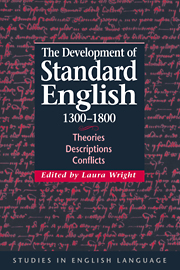Book contents
- Frontmatter
- Contents
- List of contributors
- Acknowledgements
- Introduction
- Part one Theory and methodology: approaches to studying the standardisation of English
- 1 Historical description and the ideology of the standard language
- 2 Mythical strands in the ideology of prescriptivism
- 3 Rats, bats, sparrows and dogs: biology, linguistics and the nature of Standard English
- 4 Salience, stigma and standard
- 5 The ideology of the standard and the development of Extraterritorial Englishes
- 6 Metropolitan values: migration, mobility and cultural norms, London 1100–1700
- Part two Processes of the standardisation of English
- Index
5 - The ideology of the standard and the development of Extraterritorial Englishes
Published online by Cambridge University Press: 30 September 2009
- Frontmatter
- Contents
- List of contributors
- Acknowledgements
- Introduction
- Part one Theory and methodology: approaches to studying the standardisation of English
- 1 Historical description and the ideology of the standard language
- 2 Mythical strands in the ideology of prescriptivism
- 3 Rats, bats, sparrows and dogs: biology, linguistics and the nature of Standard English
- 4 Salience, stigma and standard
- 5 The ideology of the standard and the development of Extraterritorial Englishes
- 6 Metropolitan values: migration, mobility and cultural norms, London 1100–1700
- Part two Processes of the standardisation of English
- Index
Summary
The period of the formation of Extraterritorial Englishes coincided with a time in which language prescriptivism was in full swing in Britain. This has necessarily left some traces in the way Extraterritorial Englishes have developed, and it is the aim of this paper to examine some of these influences, as well as the impact of political and socioeconomic matters on linguistic attitudes within the context of the birth of new varieties. The countries where there are first-language Extraterritorial Englishes (Ireland, Scotland, the USA, Canada, Australia, New Zealand, South Africa) and those where English is a second language (India, Nigeria, Singapore etc.) show situations that are not straightforwardly comparable for several aspects, such as different times, mechanisms and forces involved in the shaping of the new forms of English, different social and pragmatic roles of the use of English and different linguistic contexts and backgrounds. The basic common factor in all these situations is the fact that the history of the new varieties was influenced by the idea of Standard English and by the ideology surrounding this notion, though not in the same ways or to the same extent.
Roots of the ideology of the standard; the standard as colonial instrument
The rise of the first Extraterritorial Englishes was accompanied by strong criticism, and often these varieties were the object of ridicule, even before the full development of prescriptive attitudes in Britain, i.e. when the ‘English English’ standard itself was barely established (Pennycook 1994: 113).
- Type
- Chapter
- Information
- The Development of Standard English, 1300–1800Theories, Descriptions, Conflicts, pp. 73 - 92Publisher: Cambridge University PressPrint publication year: 2000
- 6
- Cited by

